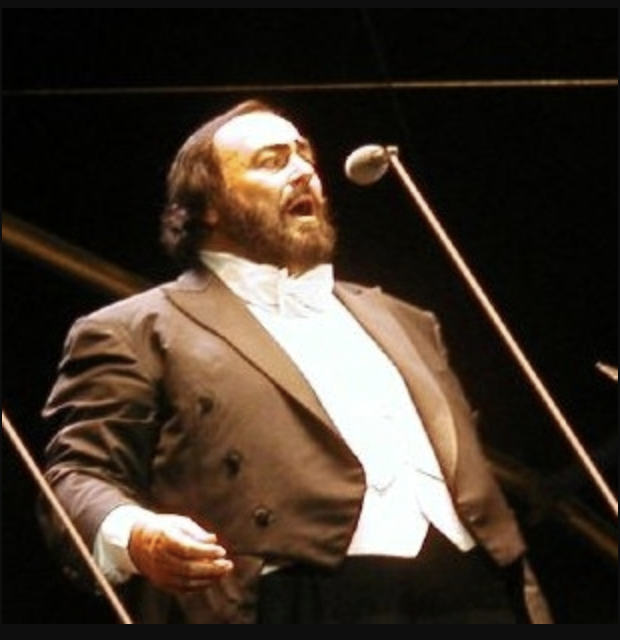Luciano Pavarotti, the so-called “King of the High Cs,” brought opera to the masses with his clear, pitch-perfect voice. In a life that began with singing on his parents’ porch as a boy in Italy and led to appearing on the world’s most famous stages, Pavarotti was a performer to his very core.
Luciano Pavarotti’s Early Days
Luciano Pavarotti was born on October 12, 1935. As a small child in Modena, Italy, Pavarotti spent many summer evenings singing with his gifted tenor father. Although his hometown was strongly associated with opera—famous soprano Mirella Freni was also born there—Pavarotti’s family encouraged him to pursue a career as a teacher.
Although his own interests lay in singing and soccer, Pavarotti enrolled in teaching college and after two years, he began teaching in a public grammar school. But his desire to sing professionally began to dominate and he sought out vocal lessons from some of the region’s finest coaches.
After winning a vocal competition in Reggio Emilia at the age of 25, he was offered his first role: a part in “La Bohème.”
Sources in this Story
- Time: Opera’s Golden Tenor
- Luciano Pavarotti Official Website: Biography
- YouTube: Pavarotti—Ave Maria
- 21st Century Music: Luciano Pavarotti
- The Biography Channel: Luciano Pavarotti
- The New York Times: Luciano Pavarotti Is Dead at 71
Pavarotti’s Notable Accomplishments
From the age of 25 onwards, Pavarotti was offered starring roles on the world’s greatest stages.
During the 1970s, Pavarotti became well known as a recording artist. He received his first Grammy in 1978 for Best Classical Vocal Solo Performance. His first American album, “O Sole Mio: Favorite Neapolitan Songs” was featured on the Billboard Top 100 list and went gold the same year. The range and pitch of Pavarotti’s voice earned him the nickname “The King of the High Cs.”
A friendship with fellow tenor Plácido Domingo led to a successful business enterprise in the 1980s as they, along with José Carreras, began performing as the Three Tenors. The trio played concert stages worldwide but didn’t achieve true fame until the 1990 World Cup, when they sang in a televised appearance the night before the final match.
The world fell in love with Pavarotti and in 1993, 500,000 people gathered in New York’s Central Park to watch him perform. Millions more watched on television. In 1994, an eponymous album from “The Three Tenors” transcended genre to land in the top five on Billboard’s Pop Charts—in between a Green Day album and the “Forrest Gump” soundtrack.
Pavarotti used his success to benefit others; he founded a charity, Pavarotti and Friends, which he supported by performing concerts with other famous musicians such as U2, Sting and Elton John. Among the causes Pavarotti’s organization supported were humanitarian aid to Bosnia and a worldwide reduction of landmines.
The Man and His Work
- “Luciano Pavarotti: The Best (Farewell Tour)” (CD)
- “Pavarotti Forever” (CD)
- “The Best of the Three Tenors” (CD)
- “The Pavarotti and Friends Collection: The Complete Concerts 1992–2000” (DVD)
- “Pavarotti: The Italian Opera Collection” (DVD)
The Rest of the Story
While his professional life was taking off, Pavarotti began to face a series of personal struggles. In the mid-1990s he was caught having an affair with his personal secretary. This led to a divorce from his wife of 35 years, Adua Veroni. He later married his mistress, Nicoletta Mantovani. During this time, he was also convicted of tax evasion by the Italian government, which sentenced him to 18 months in jail and back payment of $11 million in taxes. He did not serve any time and in 2001, he was acquitted of the charges.
Meanwhile, Pavarotti’s expanding waistline became nearly as famous as his voice. Health problems related to his weight gain made him frequently unable to perform, causing him to cancel performances. His voice began to fail, and he was caught lip-synching at a concert in his home town. His last major performance was at the opening of the Winter Olympics in 2006. Shortly afterward, he underwent emergency surgery to remove a pancreatic tumor.
By August 2007, the singer was still fighting cancer. After several weeks of hospitalization, he died in his home near Modena, Italy, in September 2007, at the age of 71.
This article was originally written by Jennifer Ferris; it was updated October 17, 2017.











